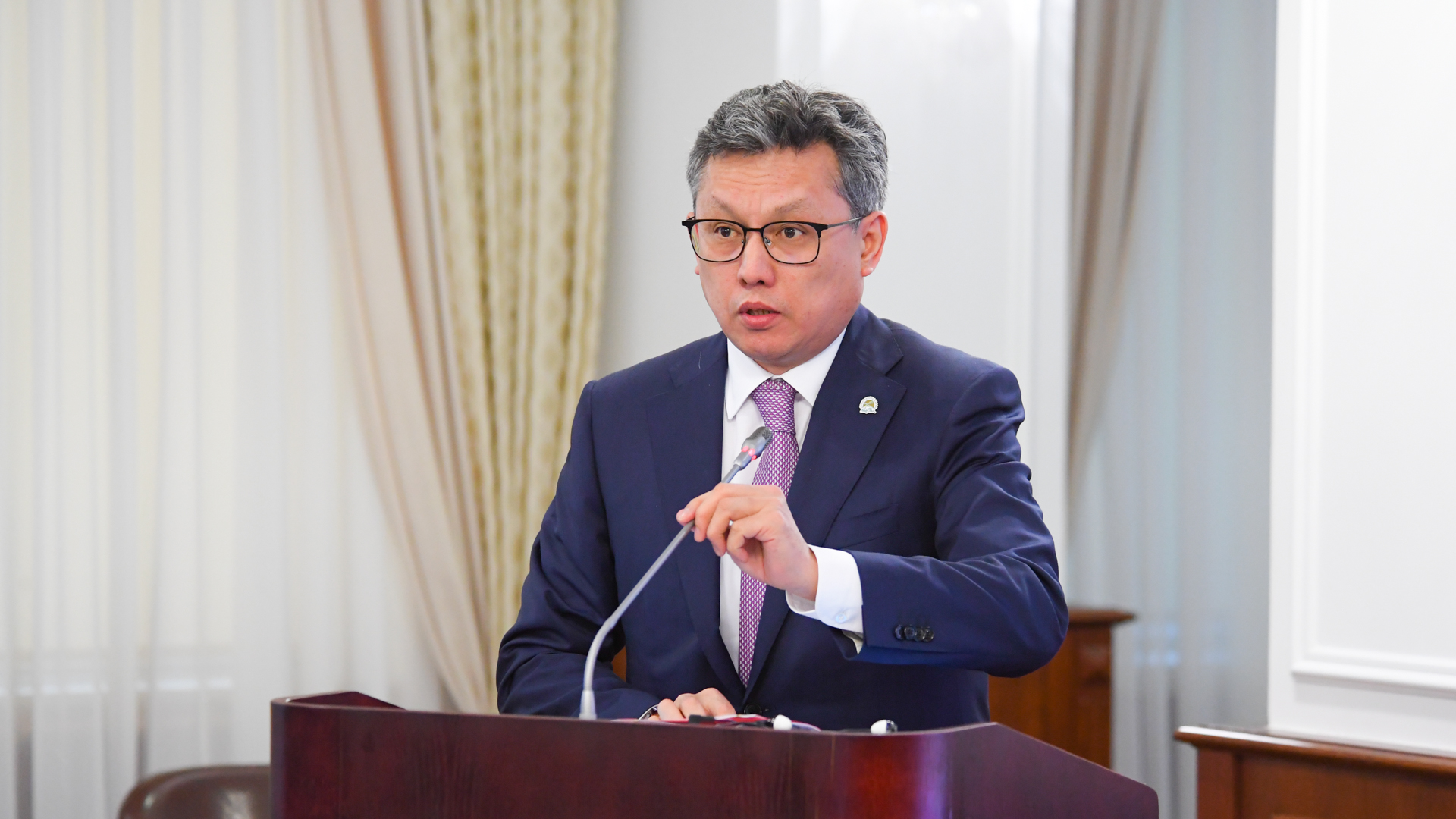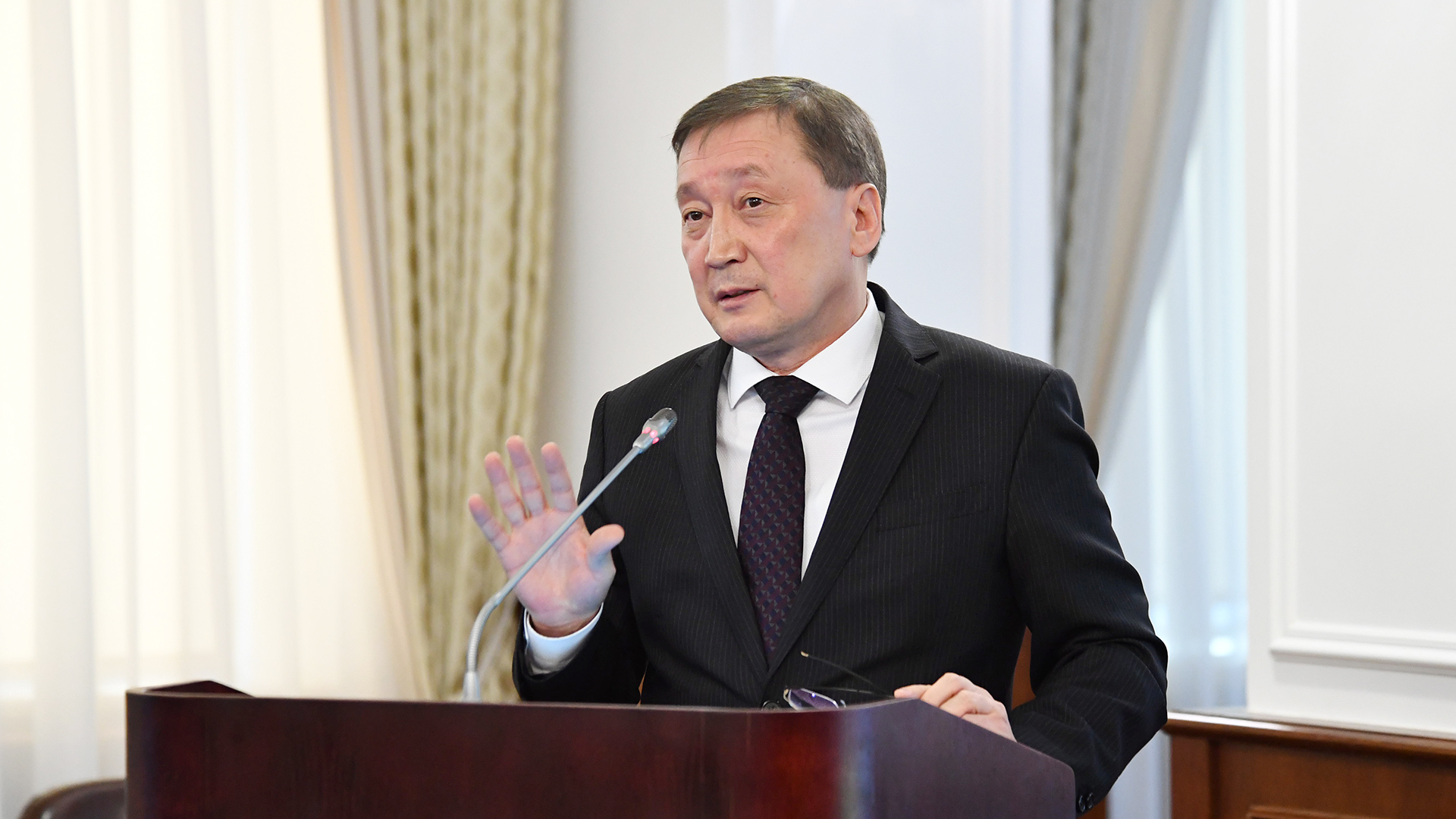28 April 2020, 10:20

At the government conference call chaired by the Prime Minister Askar Mamin, issues of ensuring food security and creating a distribution system were considered. Minister of Trade and Integration Bakhyt Sultanov and Minister of Agriculture Saparkhan Omarov reported on plans for the implementation of the project.
According to the Minister of Trade and Integration Bakhyt Sultanov, in order to ensure food security of the country, it is necessary to provide the needs of the population with high-quality agricultural and food industry goods, stabilize prices for food and essential goods, increase the productivity of domestic producers, develop efficient logistics of agricultural products and expand export channels its implementation.
“We must understand that the cost of storage and logistics of Kazakhstani goods should not become a ‘burden’ when they are delivered to both domestic and foreign markets, but should become our competitive advantage,” Sultanov said.
The current state of food security is characterized, firstly, by the lack of quality infrastructure for long-term storage. This increases the costs of the farmer.
Secondly, the lack of coordination of the objects of the trade and logistics infrastructure among themselves complicates the path of goods to the consumer.
Thirdly, the old formats of the trade infrastructure do not allow efficiently distributing products and stabilizing prices for the long term.
According to the minister, demand in the domestic market will be covered by domestic food products. However, the existing infrastructure, imperfect logistics, and the lack of interaction between the participants in the movement of goods leads to a significant increase in prices. Every citizen feels himself, especially during the off-season.
“Every year from February to May, when last year’s harvest is already depleted and the delivery of a new one from neighboring countries begins, we observe high price volatility. This, in turn, has a negative effect on inflation. The reason for the need to create a system for storing and selling products manufactured in the country is associated with the high costs of manufacturers,” Sultanov said.
According to the Ministry of Agriculture, the deficit of vegetable stores in the country is about 70%, and in some regions this figure reaches 90%. This leads to large losses of products and the inability to store them for a long period.
For example, the loss of vegetables and fruits is about 19%, meat and dairy products — 5%. This means that all expenses incurred by the entrepreneur due to losses fall on the final cost of the product. As for trade infrastructure, there are currently 750 trading markets in the country, most of which (51%) are non-stationary.
As Sultanov noted, modern unloading, which allows you to quickly load goods (now called “cross-dock”) and the lack of temperature warehouses, have a direct impact on the price. In current markets there is no information system for tracking commodity flows.
Moreover, the mechanism of producers' access to the shelves creates the basis for distorted pricing, unfair trade margins and unjustified price increases in certain periods.
“The excitement with the introduction of quarantine in our cities clearly exposed these problems. For an urgent, at the same time, systematic solution to existing problems, it is proposed to create a national distribution network consisting of a single complex of wholesale distribution centers. This ecosystem will create a separate economic cluster, which will bring the producer closer to the consumer, and will also ‘merge’ into the trade infrastructure of the republic, forming a single mechanism,” Sultanov assured.
The core of the system will be the wholesale distribution centers, classified by the functionality of trade and distribution.
Wholesale distribution centers will offer specialized services ranging from storage and processing to distribution and marketing of products. This infrastructure will make it possible to build efficient transport and logistics channels for key areas of product supply. There will also be export-import operations in the EAEU, Central Asia and China, which will expand the sales markets.
According to the minister, the network of wholesale distribution centers will become a link between the main participants in the commodity distribution system and will unite manufacturers, retailers, and suppliers into one cluster. The proposed system is fully consistent with global trends. However, when researching the world's leading systems, such as Rangis and Merkas, the state plays a key role in building the trade and logistics infrastructure.
For example, in France, of the 20 wholesale food markets, only one is private, the remaining markets are fully or partially state-owned. In Spain, the Mercasa network is also state-owned. 62% of the shares of the Warsaw Agricultural Wholesale Market also belong to the state.
“Based on the model of the distribution system and consultations with world and regional experts, we have identified clear parameters and characteristics of each link of the proposed distribution network. Wholesale distribution centers are elements of a single system, and therefore their distribution by type and function is the most effective,” Sultanov said.
Trade-oriented centers will be located 20 km away from cities with a large sales market, advantageous geographical location. Their function will be to bring farmers closer to markets.
Distribution-oriented centers are located within the city. The presence of a customs terminal on their territory will speed up the process of cargo clearance.
“We plan to build a network of wholesale distribution centers in all regions of the country, which will cover the distribution chain from producer to shelf. The creation of a distribution system is proposed to be implemented in three stages. At the first stage, it is planned to build five wholesale distribution centers focused on the storage of agricultural goods in Pavlodar, Almaty and Turkistan regions,” Sultanov said.
The total cost of the project is 237.5 billion tenge. The creation of a commodity distribution system will make it possible to attract and provide jobs for about 10.5 thousand specialists, including for the period of 4.2 thousand construction, operation of 6.3 thousand specialists.
Domestic design and construction companies will be involved in the construction of facilities.
“In general, we have developed and offered mechanisms for the full commissioning of capacities in the total volume of 4.8 million tons per year by 2022. This will completely cover the shortage of capacities and create the conditions for subsequent export expansion. With the akimats, we worked out the issues of allocation of land for the first two stages. Work on the remaining 15 facilities will be carried out as soon as possible,” added Sultanov.

The Minister of Agriculture Saparkhan Omarov, in turn, said that the existing raw material base does not ensure uniform supply of high-quality raw materials during the year due to the underdeveloped trade and logistics system, there are practically no facilities for pre-sale preparation of goods. In general, an insufficient level of integration into the sales system hinders the development of domestic production.
In some regions, the warehouse infrastructure for the storage of fruits and vegetables and food products is not sufficiently developed.
“According to preliminary data from akimats, there are 1,249 fruit and vegetable-potato storages with a total capacity of 1,908.3 thousand tons, which is not enough to ensure storage of manufactured products. With the volume of production of potatoes, cabbage, carrots, onions, beets in 2019 at 6.7 million tons and the need to store vegetables until the next harvest both for domestic consumption and export, it is necessary to have specialized capacities of about 2.8 million tons,” explained Omarov.
For its part, the Ministry of Agriculture is taking measures to increase production of fruits and vegetables through the introduction of new technologies, the development of nursery, the use of quality seeds and seedlings, the expansion of irrigated land, the use of modern irrigation machines, as well as the development, expansion and modernization of vegetable storage capacities , fruits and potatoes, which is an integral part of the trade and logistics infrastructure.
“To stimulate entrepreneurs to build vegetable stores, the ministry has provided investment subsidies in the amount of 25%, as well as concessional lending under the simple things economy program,” the minister of agriculture said.
The development of trade and logistics infrastructure through the creation of a network of wholesale distribution centers will reduce the loss of agricultural products after harvest, the exclusion of unproductive intermediaries, the access of agricultural producers to distribution networks, and the increase in sales of agricultural products both on the domestic market and in the export direction.
Stay updated about the events of the Prime Minister and the Government of Kazakhstan - subscribe to the official Telegram channel
Subscribe